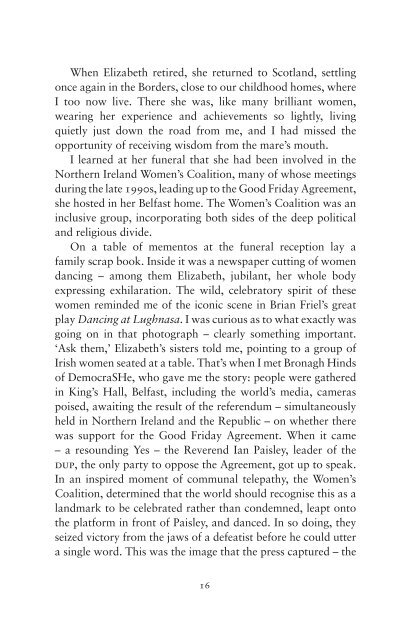Quines by Gerda Stevenson sampler
Quines: Poems in tribute to women of Scotland gives voice to 57 women from BC to the 21st century. The ‘voices’ of the poems range from those of the women featured, to inanimate objects – queens, politicians, a ship, a fish gutter, scientists, a mountain, sportswomen (including a whole football team) and many more. QUINES celebrates the richly diverse contribution women have made to Scottish history and society.
Quines: Poems in tribute to women of Scotland gives voice to 57 women from BC to the 21st century. The ‘voices’ of the poems range from those of the women featured, to inanimate objects – queens, politicians, a ship, a fish gutter, scientists, a mountain, sportswomen (including a whole football team) and many more. QUINES celebrates the richly diverse contribution women have made to Scottish history and society.
Create successful ePaper yourself
Turn your PDF publications into a flip-book with our unique Google optimized e-Paper software.
When Elizabeth retired, she returned to Scotland, settling<br />
once again in the Borders, close to our childhood homes, where<br />
I too now live. There she was, like many brilliant women,<br />
wearing her experience and achievements so lightly, living<br />
quietly just down the road from me, and I had missed the<br />
opportunity of receiving wisdom from the mare’s mouth.<br />
I learned at her funeral that she had been involved in the<br />
Northern Ireland Women’s Coalition, many of whose meetings<br />
during the late 1990s, leading up to the Good Friday Agreement,<br />
she hosted in her Belfast home. The Women’s Coalition was an<br />
inclusive group, incorporating both sides of the deep political<br />
and religious divide.<br />
On a table of mementos at the funeral reception lay a<br />
family scrap book. Inside it was a newspaper cutting of women<br />
dancing – among them Elizabeth, jubilant, her whole body<br />
expressing exhilaration. The wild, celebratory spirit of these<br />
women reminded me of the iconic scene in Brian Friel’s great<br />
play Dancing at Lughnasa. I was curious as to what exactly was<br />
going on in that photograph – clearly something important.<br />
‘Ask them,’ Elizabeth’s sisters told me, pointing to a group of<br />
Irish women seated at a table. That’s when I met Bronagh Hinds<br />
of DemocraSHe, who gave me the story: people were gathered<br />
in King’s Hall, Belfast, including the world’s media, cameras<br />
poised, awaiting the result of the referendum – simultaneously<br />
held in Northern Ireland and the Republic – on whether there<br />
was support for the Good Friday Agreement. When it came<br />
– a resounding Yes – the Reverend Ian Paisley, leader of the<br />
dup, the only party to oppose the Agreement, got up to speak.<br />
In an inspired moment of communal telepathy, the Women’s<br />
Coalition, determined that the world should recognise this as a<br />
landmark to be celebrated rather than condemned, leapt onto<br />
the platform in front of Paisley, and danced. In so doing, they<br />
seized victory from the jaws of a defeatist before he could utter<br />
a single word. This was the image that the press captured – the<br />
16


















